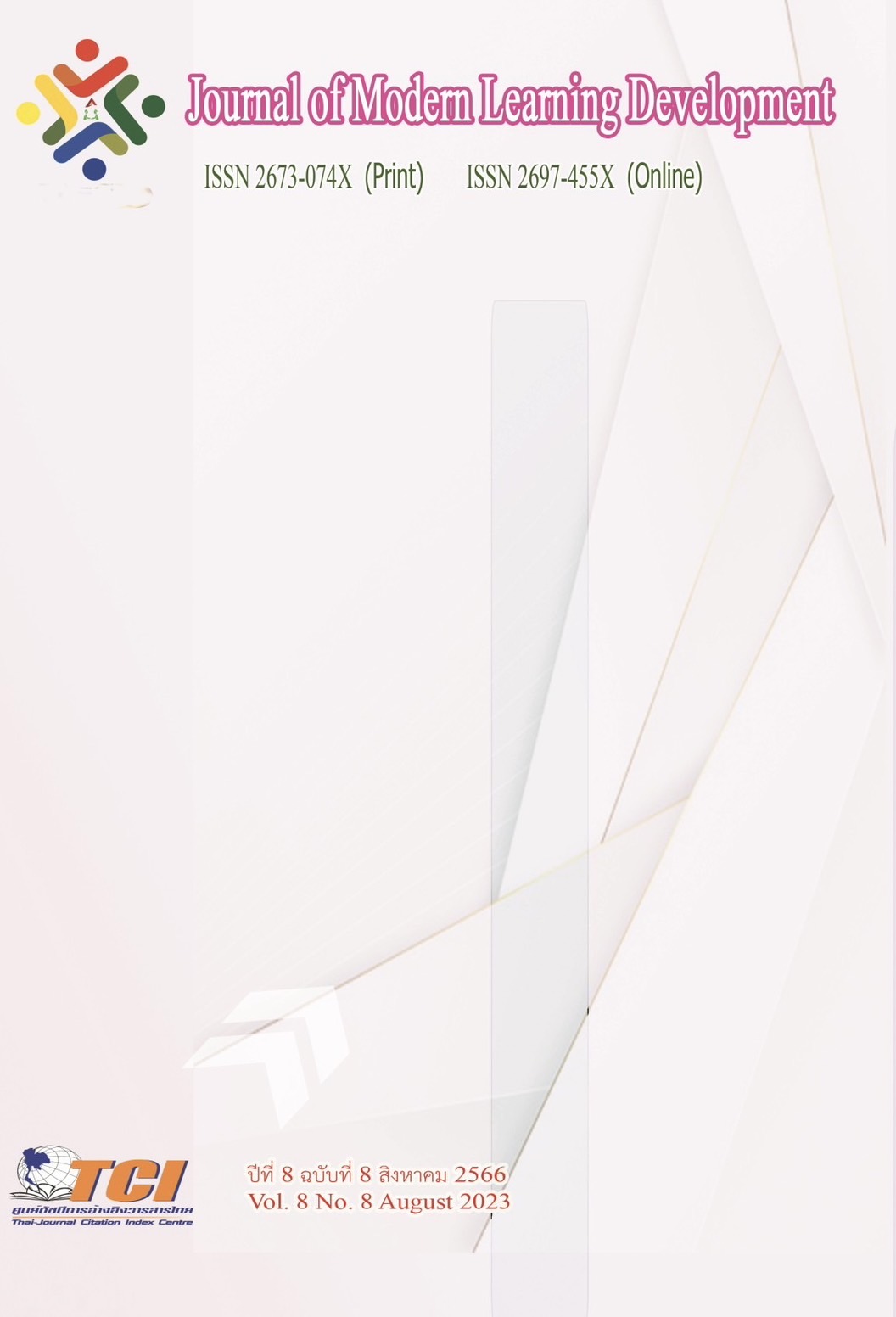ความคิดเห็นของนิสิตคณะวิศวกรรมศาสตร์ต่อปัจจัยที่ส่งผลต่อพฤติกรรม การเที่ยวกลางคืน ของนิสิตมหาวิทยาลัยมหาสารคาม
Main Article Content
บทคัดย่อ
การวิจัยในครั้งนี้มีจุดมุ่งหมายเพื่อศึกษาลักษณะทางประชากร สังคม และเศรษฐกิจของนิสิตมหาวิทยาลัยมหาสารคามที่มีพฤติกรรมเที่ยวกลางคืน และสำรวจความคิดเห็นของนิสิตคณะวิศวกรรมศาสตร์ต่อปัจจัยที่ส่งผลต่อพฤติกรรมการเที่ยวกลางคืนของนิสิตมหาวิทยาลัยมหาสารคาม โดยกลุ่มตัวอย่างในการวิจัยครั้งนี้ คือ นิสิตคณะวิศวกรรมศาสตร์ทุกชั้นปี จำนวน 400 คน กำหนดกลุ่มตัวอย่างโดยใช้ตารางของ Krejcie และ Morgan โดยใช้วิธีการสุ่มกลุ่มตัวอย่างอย่างเป็นระบบ (Systematic Random Sampling) ซึ่งในส่วนเครื่องมือที่ใช้ในการเก็บรวบรวมข้อมูล คือ แบบสอบถามแบบมาตราส่วนประมาณค่า (Rating Scale) 5 ระดับ สถิติที่ใช้ในการวิเคราะห์ข้อมูล ได้แก่ ร้อยละ ค่าเฉลี่ย และส่วนเบี่ยงเบนมาตรฐาน
ผลการศึกษาพบว่า นิสิตมหาวิทยาลัยมหาสารคามที่ไปเที่ยวกลางคืนส่วนใหญ่เป็นนิสิตชาย สถานที่ที่นิสิตชอบไปเที่ยวมากที่สุด คือ ร้านเหล้าที่มีระบบแสงสีเสียงที่ทันสมัย โดยนิสิตมักจะชอบไปเที่ยวในวันศุกร์สุดสัปดาห์ โดยมีความถี่ในการไปเที่ยว 2-3 ครั้งต่อสัปดาห์ ซึ่งในการไปเที่ยวของนิสิตแต่ละครั้งมีค่าใช้จ่ายเฉลี่ยอยู่ที่ 300-400 บาท และแหล่งค่าใช้จ่ายในการไปเที่ยวกลางคืนของนิสิตมาจากเงินที่ได้รับจากผู้ปกครองเป็นหลัก และนิสิตคณะวิศวกรรมศาสตร์ มีความคิดเห็นต่อปัจจัยที่ส่งผลต่อพฤติกรรมการเที่ยวกลางคืนของนิสิตมหาวิทยาลัยมหาสารคาม โดยภาพรวมอยู่ในระดับปานกลาง (x̄ = 2.87) และเมื่อพิจารณาเป็นรายด้านพบว่า พฤติกรรมการเที่ยวกลางคืนของนิสิตมหาวิทยาลัยมหาสารคาม มาจากด้านสัมพันธภาพระหว่างเพื่อนมากที่สุด (x̄ = 3.29) ชี้ให้เห็นว่า กลุ่มเพื่อนมีความสำคัญที่สุดสำหรับนิสิตมีการสร้างพื้นที่ในการทำกิจกรรมร่วมกัน รองลงมา คือ ด้านทัศนคติส่วนบุคคล (x̄ = 3.14) สะท้อนให้เห็นว่า นิสิตที่กำลังศึกษาในระดับมหาวิทยาลัย เป็นวัยที่มีการเปลี่ยนแปลงทางด้านร่างกาย จิตใจ ต้องการความเป็นอิสระสูง และเป็นวัยที่อยากรู้อยากลอง จึงอยากแสวงหาประสบการณ์แปลกใหม่ในชีวิตด้วยการไปเที่ยวกลางคืนเพื่อพบเจอผู้คนและสิ่งที่ตนยังไม่เคยพบเห็นมาก่อน ต่อมาคือ ด้านสังคมและสภาพแวดล้อม (x̄ = 2.79) ชี้ให้เห็นว่า บรรยากาศและการออกแบบสภาพแวดล้อมภายในร้านที่ดีมีผลต่อการเที่ยวกลางคืนของนิสิตเป็นอย่างมาก อีกทั้งการโฆษณาของสถานบันเทิงผ่านทางสื่อโซเชียลมีเดียที่นิสิตสามารถเข้าถึงง่ายมีการจัดโปรโมชั่นเพื่อดึงดูดความสนใจอยู่ตลอดเวลา และด้านที่อยู่ในระดับน้อยที่สุด คือ ด้านสัมพันธภาพในครอบครัว (x̄ = 2.25) ชี้ให้เห็นว่า ครอบครัวยังเป็นสถาบันที่ก่อให้เกิดรากฐานที่ดีทางจิตใจ และนิสิตเองมีความเห็นอกเห็นใจบิดาและมารดาที่ต้องทำงานหนักเพื่อให้มีรายได้มาจุนเจือครอบครัวและเป็นค่าใช้จ่ายในการเรียนของนิสิตเองจึงเป็นส่วนสำคัญที่ช่วยลดความอยากเที่ยวกลางคืนของนิสิตได้โดยตรง
Article Details
เอกสารอ้างอิง
กระทรวงพัฒนาสังคมและความมั่นคงของมนุษย์. (2548). รายงานสถานการณ์เด็กและเยาวชนประจำปี 2546-2547. กรุงเทพมหานคร : ม.ป.ท.
กีรติ เปลี่ยนสมัย. (2555). พฤติกรรมการเที่ยวสถานเริงรมย์ของนิสิตปริญญาตรี มหาวิทยาลัยบูรพา จังหวัดชลบุรี. งานนิพนธ์รัฐประศาสนศาสตรมหาบัณฑิต สาขาวิชาเศรษฐศาสตร์การเมืองและการบริหารจัดการ คณะรัฐศาสตร์และนิติศาสตร์. บัณฑิตวิทยาลัย: มหาวิทยาลัยบูรพา.
จำนงค์ อดิวัฒนสิทธิ์ และคณะ. (2548). สังคมวิทยา. (พิมพ์ครั้งที่ 8). กรุงเทพมหานคร: มหาวิทยาลัย เกษตรศาสตร์.
บุญชม ศรีสะอาด. (2545). การวิจัยเบื้องต้น. (พิมพ์ครั้งที่ 7). กรุงเทพมหานคร: สำนักพิมพ์สุวีริยาสาส์น.
ลิขิต กาญจนาภรณ์. (2547). สุขภาพจิต. (พิมพ์ครั้งที่ 3). นครปฐม : มหาวิทยาลัยศิลปากร.
วิทยากร เชียงกูล. (2552). ก้าวข้ามปัญหาและพัฒนาศักยภาพด้านบวก. กรุงเทพมหานคร : สำนักพิมพ์สายธาร.
ศรีเรือน แก้วกังวาล. (2553). จิตวิทยาพัฒนาการชีวิตทุกช่วงวัย. กรุงเทพมหานคร: สำนักพิมพ์มหาวิทยาลัยธรรมศาสตร์.
สํานักงานคณะกรรมการการศึกษาขั้นพื้นฐาน. (2549). กระทรวงศึกษาธิการ. กรุงเทพมหานคร: กระทรวงศึกษาธิการ.
Erikson, H. E. (1967). Indentity and life cycle. New York : International University.


